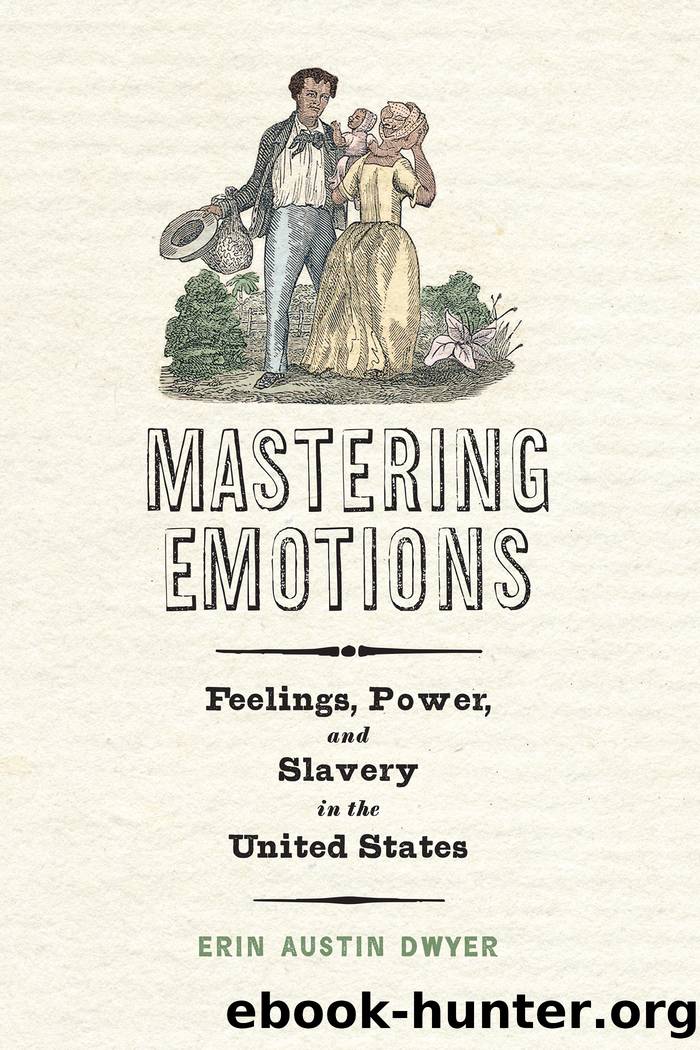Mastering Emotions by Erin Austin Dwyer

Author:Erin Austin Dwyer [Dwyer, Erin Austin]
Language: eng
Format: epub
ISBN: 9780812253399
Publisher: University of Pennsylvania Press, Inc.
Published: 2021-09-15T00:00:00+00:00
Gendering Affective Discipline
Affective discipline was employed to keep enslaved people in line and to prevent them from running away, but it was also a gendered punishment, frequently engaged to threaten or punish enslaved women in order to compel sexual relations. Many slaveholders and overseers comprehended that a woman who was isolated from her parents, spouse, or children might be more vulnerable to their sexual predations.69 Not long after coming to one of her husbandâs Georgia plantations, Fanny Kemble wrote about an enslaved woman she met named Judy, who recounted tales of abuse at the hands of the plantation overseer, Mr. King. After rebuffing his sexual advances King âflogged her severelyâ for refusing to yield, before he âsent her off, as a further punishment, to Five Pound,â a separate, remote plantation where she claimed slaves were âsometimes banished.â Judy conceded that as âbad as the flogging was, she would sooner have taken that again than the dreadful lonely days and nights she spent on the penal swamp of Five Pound.â70 Like Brown and Douglass, Judy had experienced both physical and affective discipline, and she concluded that punishments that targeted her emotions were worse to endure. Judyâs account also stresses the gendered aspects of affective discipline. As the most frequent targets of sexual harassment and assault, enslaved women were faced with two terrifying options: succumb to their owner or overseer, or face temporary or permanent exile from their loved ones.
An 1860 letter from a Maryland planter named T. D. Jones to an enslaved woman named Eliza is a harrowing example of a slaveholder selling an enslaved person as punishment rather than for profit, and it shows how this was used to affectively discipline enslaved women who resisted an ownerâs desires. In the biting letter Jones wrote that he had sold Eliza away from her daughter Jennie because he believed Eliza to be âungratefulâ and untrustworthy. However, over the course of the letter he insinuated that he had actually separated Eliza from her young daughter to punish Eliza for an unspecified emotional slight that he believed she had committed. Eliza had previously written to inquire about her daughter, âexpressing the hopeâ that her master would permit Jennie to come live with her. Eliza longed for her daughter enough to write to her former owner, but his letter was calculated to make Eliza feel the pangs of separation all the more deeply. Jones blithely announced that he had read the letter to Jennie, adding that Jennie âseemed glad to hear from ⦠Aunt Liza ⦠(as she calls you).â Nevertheless, he replied that Jennie herself âdoesnât want to go away from her master.â In his response the tension of their affective tug-of-war was palpable, as was his desire to inflict heartache. The slaveholder first emphasized how little Eliza meant to her daughter, noting that Eliza was no longer referred to as âmother,â but as the more cordial âAunt Liza,â before telling Eliza that her own daughter allegedly preferred to stay with her owner rather than be reunited with her mother.
Download
This site does not store any files on its server. We only index and link to content provided by other sites. Please contact the content providers to delete copyright contents if any and email us, we'll remove relevant links or contents immediately.
| Civilization & Culture | Expeditions & Discoveries |
| Jewish | Maritime History & Piracy |
| Religious | Slavery & Emancipation |
| Women in History |
Cecilia; Or, Memoirs of an Heiress — Volume 1 by Fanny Burney(32554)
Cecilia; Or, Memoirs of an Heiress — Volume 2 by Fanny Burney(31951)
Cecilia; Or, Memoirs of an Heiress — Volume 3 by Fanny Burney(31935)
The Secret History by Donna Tartt(19066)
Sapiens: A Brief History of Humankind by Yuval Noah Harari(14376)
Leonardo da Vinci by Walter Isaacson(13323)
The Radium Girls by Kate Moore(12022)
Sapiens by Yuval Noah Harari(5367)
How Democracies Die by Steven Levitsky & Daniel Ziblatt(5217)
The Wind in My Hair by Masih Alinejad(5093)
Homo Deus: A Brief History of Tomorrow by Yuval Noah Harari(4911)
Endurance: Shackleton's Incredible Voyage by Alfred Lansing(4775)
Man's Search for Meaning by Viktor Frankl(4590)
The Silk Roads by Peter Frankopan(4528)
Millionaire: The Philanderer, Gambler, and Duelist Who Invented Modern Finance by Janet Gleeson(4473)
The Rape of Nanking by Iris Chang(4209)
Joan of Arc by Mary Gordon(4106)
The Motorcycle Diaries by Ernesto Che Guevara(4093)
Stalin by Stephen Kotkin(3962)
